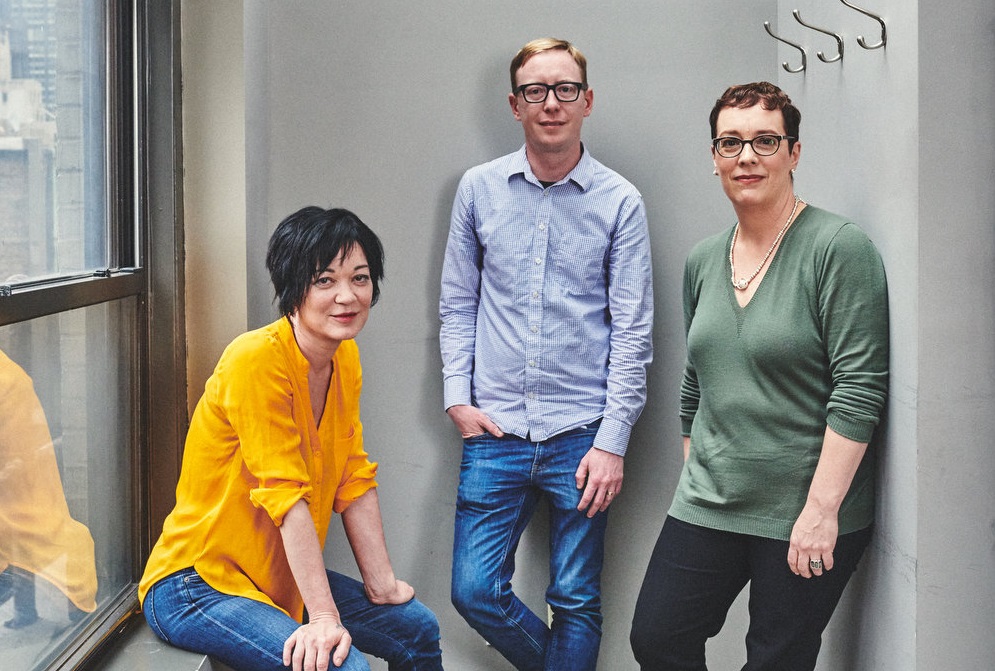Craigslist Creator Funds: Website against fake news, discrimination and inflection of Internet giants
- Transfer
News site for the study of large technologies with the assistance of the founder Craigslist
The Markup, dedicated to the study of technology and their impact on society, will be led by two former journalists ProPublica. Craig Newmark allocated $ 20 million to help fund this project.

In the photo: From left to right: Markup executive director Sue Gardner, managing editor Jeff Larson and editor-in-chief Julia Angwin.
When Julia Angwin, a research journalist, worked at ProPublica, the nonprofit news organization became known as the “most terrible“ guard dog ”of great technology.
Through collaboration with programmers and data processing and analysis specialists, Ms. Angwin began work on the study of high-tech algorithms — secret codes that have a huge impact on everyday life in America. Its results shed light on how companies such as Facebook create tools that can be used to promote racial prejudice, fraudulent schemes and extremist content.
Now, with a $ 20 million gift from Craig Newmark, she and her ProPublica partner, data journalist Jeff Larson, are creating The Markup, a news site dedicated to the study of technology and their impact on society. Sue Gardner, the former director of the Wikimedia Foundation, in which Wikipedia is located, will become the executive director of Markup. Ms. Angwin and Mr. Larson stated that they hired two dozen journalists for their office in New York and that stories would start appearing on the website in early 2019. The group also raised $ 2 million from the John S. and James L. Knight Foundation and $ 1 million from the Ford Foundation, the Foundation for Managers, and the Ethics and Governance of the Artificial Intelligence Initiative.
Ms. Angwin compares technology with canned food, which took some time to innovate with great attention.
“When canned food appeared, it was amazing,” said Ms. Angwin, who will be the chief editor of the site. “You could have peaches when it was not a season. There was a whole period in America when every recipe called for canned soup. People are crazy about canned food. And after 30 years, 40 years, they are: "Hm, wait."
“This is what happened to technology,” said Ms. Angwin, calling the elections in 2016 a turning point. "And I'm so glad we all woke up."
The site will cover three broad categories of research:
- how profiling software discriminates against poor and other vulnerable groups;
- Internet health and its infections, such as bots, fraud and misinformation;
- the incredible power of information technology companies.
The Markup will release all of its stories under a Creative Commons license so that other organizations can republish them, as ProPublica does .
Ms. Angwin, who was part of the Wall Street Journal team, won the Pulitzer Prize in 2003 for exposing corporate corruption, said the editors would be guided by the scientific method, and each story would begin with a hypothesis. For example: Facebook allows racist housing ads. In ProPublica, Ms. Angwin’s team bought an ad on the site and proved its hypothesis .
In The Markup, journalists will collaborate with the programmer from the moment the story is created to its completion.
“To explore technology, you need to understand technology,” said Ms. Angwin, 47. “Just as I received a Master of Economics degree in management as a business reporter, I believe that technology professionals need to be involved from the very beginning of technical research.”
Ms. Angwin has known Mr. Newmark since 1997, when she wrote about him as a reporter in The San Francisco Chronicle.
“Craig is perfect for us because he has no interest or temper to try to intervene in the report,” she said.
Mr Newmark, torn between San Francisco and New York, remained in the shadows for many years. But he worries about noticing the lack of introspection among engineers.

Mr Larson, Mrs. Angwin and Mrs. Gardner at work in New York. Brian Derballa for The New York Times.
“Sometimes it takes some time for an engineer to understand that we need help, then we get this help, and then we do a lot better,” Mr. Newmark said. “We need help that only journalistic research and intelligent data processing can provide.”
Craigslist, which Mr. Newmark founded in the mid-1990s, helped to destroy the main source of income for printed newspapers at the time due to a page with classified ads. He recently provided several significant donations to journalistic institutions, including $ 20 million from the CUNY Graduate School of Journalism .
“We are now in the information war,” said Mr. Newmark.
For many years, the stunning success of Silicon Valley companies and the public relations groups that worked for them have forced many journalists to surrender their powers ahead of time.
The social effects of technology were poorly quantified, and moral responsibility often turned into something called an algorithm that most people could not explain or study. Even if, like in the case of Facebook, it affected about 2.5 billion people .
In ProPublica, Ms. Angwin and Mr. Larson completely destroyed the traditional model of technology reporting. They are not interested in accessibility. With the right tools, they could study the impact.
“There is an opportunity for more reporters to use statistics to identify public harm,” said Mr. Larson, who has been involved in data journalism for ten years. “And then Julia’s gift comes into force - she practices data journalism, but does not turn her into an academic report.”
Some of the reporting tactics of Ms. Angwin and Mr. Larson may violate the terms of service of the technical platform, which prohibit people from automatically collecting public information and prohibiting them from creating temporary research accounts. Ms. Angwin was an ardent defender of this practice and argued that technical companies should allow journalists to be the exception to the rule.
“Without breaking these rules, journalists cannot investigate our most important public discussion platform,” Ms. Angwin wrote in August .
The two worked together to investigate the sentencing software, which took a year. Ms. Angwin has been reporting and writing. Mr. Larson measured and analyzed. In the end, they proved that the algorithm was racially biased .
Mr Larson, who will be the managing editor of Markup, said that the result for those who studied the bias of the algorithm turned out to be as unexpected for them as for the readers.
“Increasingly, algorithms are being used as an easy way to disclaim responsibility,” said Mr Larson, 36. “We do not have enough people to consider parole decisions, so we are going to transfer them to the computer and the computer will in turn make these decisions, and as soon as they go into production, there will be no control over this procedure.”
They also demonstrated how large technology companies help extremist websites to make money , how African Americans overpay for car insurance , and how Facebook allowed political advertisements that It really was fraud and malware .
“There are unintended consequences,” said Mr Larson. "In all three cases, this turned out to be a big surprise for people who took part in the creation of these algorithms."
The engineers who wonder at the tools they created are part of the problem according to the Markup team.
“Part of The Markup’s intention is to increase the understanding of technology and its implications, we all will benefit from a broader understanding,” said Ms Gardner. "And I would include in this process people who work for the company."
Ms. Angwin said that part of her goal was to help readers understand what they should worry about when it comes to technology.
“We are all a little unsure,” said Ms. Angwin. “There is no evidence. I want to provide evidence. ”
She hopes that the stories they take on will lead to better government and corporate policies.
“We are a data society based on data,” said Ms. Angwin. "Nowadays, this is the price paid for letting political changes into our lives — a data set."
And in the process of finding this information, Ms. Angwin said that she did not bother to get Facebook or Google to answer her phone calls.
“I have never been on Google or Facebook, and I think I will never be invited,” she said. "I'm like a mad scientist who makes measurements of various things."
Translation: Diana Sheremyeva

About #philtech
#philtech (технологии + филантропия) — это открытые публично описанные технологии, выравнивающие уровень жизни максимально возможного количества людей за счёт создания прозрачных платформ для взаимодействия и доступа к данным и знаниям. И удовлетворяющие принципам филтеха:
1. Открытые и копируемые, а не конкурентно-проприетарные.
2. Построенные на принципах самоорганизации и горизонтального взаимодействия.
3. Устойчивые и перспективо-ориентированные, а не преследующие локальную выгоду.
4. Построенные на [открытых] данных, а не традициях и убеждениях
5. Ненасильственные и неманипуляционные.
6. Инклюзивные, и не работающие на одну группу людей за счёт других.
Акселератор социальных технологических стартапов PhilTech — программа интенсивного развития проектов ранних стадий, направленных на выравнивание доступа к информации, ресурсам и возможностям. Второй поток: март–июнь 2018.
Чат в Telegram
Сообщество людей, развивающих филтех-проекты или просто заинтересованных в теме технологий для социального сектора.
#philtech news
Телеграм-канал с новостями о проектах в идеологии #philtech и ссылками на полезные материалы.
Подписаться на еженедельную рассылку
1. Открытые и копируемые, а не конкурентно-проприетарные.
2. Построенные на принципах самоорганизации и горизонтального взаимодействия.
3. Устойчивые и перспективо-ориентированные, а не преследующие локальную выгоду.
4. Построенные на [открытых] данных, а не традициях и убеждениях
5. Ненасильственные и неманипуляционные.
6. Инклюзивные, и не работающие на одну группу людей за счёт других.
Акселератор социальных технологических стартапов PhilTech — программа интенсивного развития проектов ранних стадий, направленных на выравнивание доступа к информации, ресурсам и возможностям. Второй поток: март–июнь 2018.
Чат в Telegram
Сообщество людей, развивающих филтех-проекты или просто заинтересованных в теме технологий для социального сектора.
#philtech news
Телеграм-канал с новостями о проектах в идеологии #philtech и ссылками на полезные материалы.
Подписаться на еженедельную рассылку
